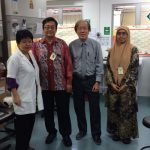2 Jan 2015 – Prof Yeoh Peng Nam, Dean of the School of Pharmacy at the International Medical University (IMU) successfully secured a grant under the National Key Economic Area (NKEA) Research Grant Scheme from the Ministry of Agriculture and Agro-Based Industry, Malaysia. The total amount of funds approved for the two-year project is RM 408, 900.
With this grant, Prof Yeoh will work on her project titled “Efficacy of Andrographis Paniculata in Preventing the Systemic Inflammation, Metabolic Dysfunction and Atherosclerosis Induced by Cholesterol-enriched High-fat Diet in Animal Models”. This project is a part of a main project in the Priority Research Focus Area (PRFA) headed by Prof Johnson Stanslas from the Pharmacotherapeutics Unit of Universiti Putra Malaysia. The research team consists of Prof Mallikarajuna Rao Pichika (IMU), Dr Sreenivasa Rao Sagineedu (IMU), Dr Subashini C Thambiah (IMU), and Thirumurugan Rathinasabapathy (IMU).
Andrographis paniculata (A. paniculata) is a plant native to South Asian countries such as India and Sri Lanka. Commonly known as “king of bitters”, it is an herb traditionally used in Ayurveda and Traditional Chinese Medicine. Its leaf and underground stem are used to make medicine. Andrographis is frequently used for preventing and treating common cold and influenza (flu). In Malaysia, it is known as Hempedu Bumi, which literally means ‘bile of earth’ since it is one of the bitterest plants that are used in traditional medicine.
The main objective of this project is to assess the potential use of A. paniculata extracts in inhibiting inflammation processes for protection against chronic inflammatory disorders. The studies are conducted using in vitro (outside the body) and in vivo (inside the body) models. Inflammation is the body’s self-defence system to protect us from infection by foreign organisms such as bacteria and viruses.
There is accumulating evidence suggesting that inflammation is one of the important causes of cardiovascular (heart) diseases and also considered to be at the centre stage of metabolic dysfunction (abnormality in the process of converting the food into energy by the body system). Recently, many anti-inflammatory approaches have emerged to reduce acute cardiovascular events and obesity, in addition to the existing lipid-lowering therapies. Therefore, anti-inflammatory therapeutic strategies would prevent metabolic dysfunction and atherosclerosis (the building up of fat, cholesterol, and other substances in the walls of blood vessels) induced by high-fat/high-cholesterol diet.
Prof Yeoh and her team hypothesise that A. paniculata extract would prevent induced-metabolic dysfunction and atherosclerosis in rats fed with cholesterol-enriched high-fat diet through new/novel mechanism of action. They are looking into the effectiveness of the A. paniculata extracts in preventing heart diseases and metabolic dysfunction.









